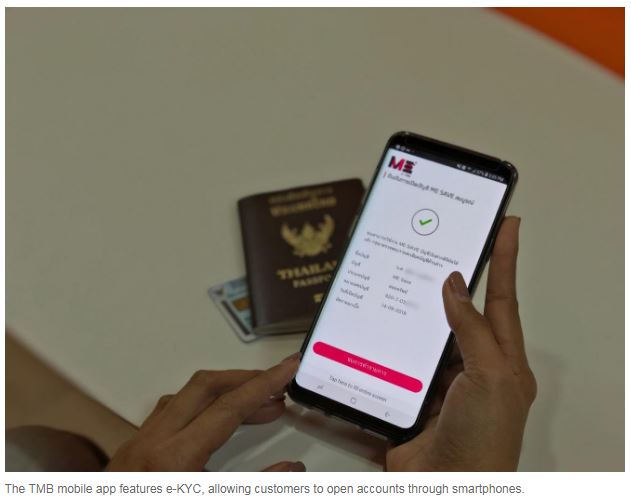Thailand: E-KYC opens new chapter in banking
Mobile banking usage has soared for every age group after digital transaction fees were scrapped a few years ago, but digital authentication, also known as electronic know-your-customer (e-KYC), is expected to open a new chapter in the online banking boom.
Financial service providers that go digital face a dilemma. They are obliged to verify the identity of customers to comply with regulatory requirements, but they also strive to deliver a customer-friendly experience to keep existing customers and acquire new ones.
An e-KYC process that is not burdensome solves both issues, verifying customers digitally so they don’t have to waste time at branches.
The technology paves the way for more banking services on mobile and electronic devices.
With online verification, consumers, particularly those who are unbanked, can open new accounts, apply for loans online, take out new life insurance policies and invest in new mutual fund companies through electronic devices, especially smartphones, in an era when consumers prefer to interact through online channels.
 E-KYC on horizon
E-KYC on horizon
Local banks are gearing up to adopt e-KYC through biometric technology after the innovation exits from the central bank’s regulatory sandbox.
The Bank of Thailand said recently that facial recognition technology for digital verification of 10 banks would start to exit from the regulatory sandbox by the third quarter of this year.
However, banks that use ID cards as the main document for digital authentication must wait for the implementation of the government’s National Digital ID (NDID) before scaling up the technology to the full digital system, the stage that no longer needs users to travel to branches to verify themselves.
Pending the conclusion of its e-KYC experiment in the regulatory sandbox, Kasikornbank (KBank) is gathering digital data from its existing customers in preparation for digital authentication’s formal adoption, said first senior vice-president Supreecha Limpikanjanakowit.
The bank aims to collect data on the digital platform of 1 million customers a year. The data from 300,000 customers has already been electronically processed, Mr Supreecha said.
KBank, the country’s second-largest lender by assets and the leading digital banking service provider, has 14.5 million customers.
Under the digital data-gathering process, the bank updates customer information through ID card readers available at branches and takes customers’ photos, then sends the data to its headquarters for authentication via facial recognition technology.
The digital database not only provides convenience to customers making financial transactions on electronic devices, but it also opens opportunities for the bank to cross- sell financial products, including savings, investment and loan products, to customers through the online platform.
Thakorn Piyapan, head of digital banking and innovation at Bank of Ayudhya, said BAY still requires customers to visit one of its 660 branches nationwide to use ID cards and photos for verification and authentication through facial recognition technology, as national ID data is unavailable on the digital platform so far.
The bank is one of the 10 financial institutions whose e-KYC technology is in the regulatory sandbox.
E-KYC is not mandatory for the bank’s customers, but those who don’t apply for the technology are required to visit branches to sign documents and verify themselves when using new financial services, Mr Thakorn said.
“We’ve already collected and updated information for about 300,000 customers on the digital database, and the process continues,” he said. “The collection also depends on comprehensive data of a customer and their consent, so we cannot set a clear time frame for the process.”
He gave assurances that digital authentication is accurate and secure, thanks to advanced technology.
Unlike KBank and BAY, Siam Commercial Bank (SCB), the second-largest mobile banking service provider, allows customers to verify themselves by scanning passports and ID cards through its mobile banking app, SCB Easy.
Given passports embedded with radio-frequency identification (RFID) chips in which biometric data is stored, SCB Easy users can then verify themselves on the app by using Android smartphones with operating systems of 5.1 or above that support near-field communication (NFC) to touch the back page of the passport.
Moreover, users need to fill in details available on SCB Easy and take three pictures of their face, including when they smile and blink, to certify that they are a real person.
SCB’s e-KYC has been in the regulatory sandbox since last August, and the bank now offers e-KYC on its mobile app for opening deposit accounts.
“SCB will focus mainly on the new-to-bank segment to expand the customer base via innovative technology,” said first executive vice-president Auraratana Jutimitta.
The bank said recently that e-KYC entails a false positive rate of a mere 0.01%.
SCB has also adopted iOnboard, a facial recognition technology for opening new accounts for deposits, mutual funds and securities trading accounts at physical branches. The bank, with iOnboard technology, requires a customer’s ID card for verification.
In the initial stage, the bank is testing the technology at its 460 branches nationwide.
 Security concerns remain
Security concerns remain
Yada Saengthong, a senior-ranking employee at a company, said that even though she is quite familiar with using mobile phones for making financial transactions, she will not be among early users of digital authentication technology for financial services, as she is still worried about security and personal privacy.
“The technology would offer consumers more convenience because they can open new deposit accounts and apply for loans by themselves through their mobile phones, but I prefer waiting for others to use it to ensure that it’s safe enough,” she said.
Ms Yada, 45, uses mobile banking apps to transfer money and pay credit card bills every month, and she is confident that the system is stable and secure.
Source: https://www.bangkokpost.com/business/finance/1696548/e-kyc-opens-new-chapter-in-banking


 Thailand
Thailand




